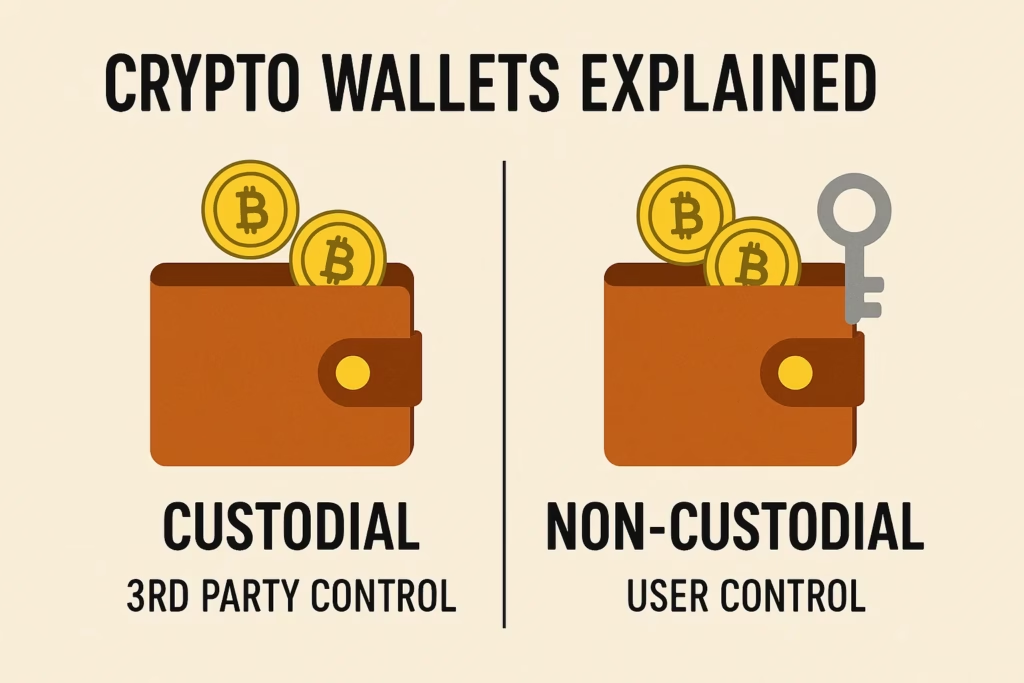Understanding the Key Differences and Choosing the Right Wallet for You
As more people enter the world of cryptocurrency, one of the first questions they face is: How do I store my crypto safely? The answer lies in crypto wallets—and more specifically, whether to use a custodial or non-custodial wallet. Our beginner’s crypto investment guide is a great starting point
This guide breaks down the difference, pros and cons of each, and how to choose the best wallet for your needs.
🔐 What Is a Crypto Wallet?
A crypto wallet is a tool that allows users to store and manage their private keys, essential for accessing and using their cryptocurrency. While crypto itself isn’t stored in a wallet (it’s on the blockchain), your wallet secures the keys that prove ownership.
There are two main types of wallets:
- Custodial Wallets
- Non-Custodial Wallets
🏦 Custodial Wallets: Crypto Held by a Third Party
With a custodial wallet, a third party—usually a crypto exchange like Coinbase, Binance, or Kraken—holds and secures your private keys on your behalf.
✅ Pros:
- User-Friendly: Perfect for beginners, no need to worry about keys.
- Password Recovery: Lost access? You can reset it like a regular account.
- Built-In Features: Easy access to trading, staking, and portfolio tools.
❌ Cons:
- Not Your Keys: “Not your keys, not your coins.”
- Risk of Freezes or Hacks: Exchanges can freeze assets or be hacked.
- Limited Control: You can’t move crypto without the platform’s permission.
🔓 Non-Custodial Wallets: Full Control of Your Crypto
A non-custodial wallet gives you full ownership of your private keys. Examples include MetaMask, Trust Wallet, Ledger, and Exodus. These can be software-based or hardware devices.
✅ Pros:
- Total Control: You and only you own your crypto.
- Decentralization: Ideal for DeFi, staking, and privacy-focused users.
- Greater Security: No exchange middleman means fewer third-party risks.
❌ Cons:
- Responsibility Is Yours: Lose your keys or seed phrase? Your crypto is gone.
- Learning Curve: Requires more technical understanding.
- No Recovery Options: If you forget credentials, there’s no customer support.
🔍 Custodial vs Non-Custodial: Quick Comparison
| Feature | Custodial Wallet | Non-Custodial Wallet |
|---|---|---|
| Key Ownership | Platform-controlled | User-controlled |
| Security Responsibility | Platform | User |
| Recovery Options | Yes | No |
| Ideal For | Beginners, traders | Experienced users, DeFi |
| Examples | Binance, Coinbase | Trust Wallet, MetaMask |
🧠 Which Should You Choose?
It depends on your goals:
- New to crypto or active trader? Start with a custodial wallet for ease.
- Privacy-focused or long-term holder? Use a non-custodial wallet for control.
- Best of both worlds? Use both: store trading funds in a custodial wallet and savings in a hardware or non-custodial wallet.
✅ FAQ: Crypto Wallets – Custodial vs Non-Custodial
What is the main difference between custodial and non-custodial wallets?
A custodial wallet is managed by a third party (like an exchange), while a non-custodial wallet gives you full control of your private keys.
Are non-custodial wallets more secure?
They offer more control and privacy but require you to manage your own security. If you lose your keys or seed phrase, there’s no recovery option.
Can I use both wallet types?
Yes! Many users keep trading funds in custodial wallets and store long-term holdings in non-custodial wallets like hardware wallets.
Is a custodial wallet good for beginners?
Yes. Custodial wallets are user-friendly and offer password recovery, making them ideal for new crypto users.
What are some examples of each wallet type?
Custodial: Coinbase, Binance, Crypto.com
Non-Custodial: MetaMask, Trust Wallet, Ledger Nano, Exodus
🔚 Final Thoughts
Crypto wallets are more than just storage—they define your freedom, responsibility, and security in the blockchain world. Whether you choose a custodial wallet for convenience or a non-custodial wallet for control, understanding the difference helps you make smarter decisions in your crypto journey.

